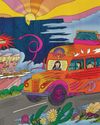
Leonard Cohen never liked touring. "It's like being dropped off in a desert," he once said. "You don't know where you live anymore." By the time he hit his late 50s, he hated it so much that, after supporting his 1992 record, The Future, he moved into a Zen monastery and all but retired from the music business. Even after he returned with More Best of Leonard Cohen (1997), a wonderful celebration of his mid-career prime, he refused to cash in with a fresh calendar of live shows. Then, in 2005, he discovered that his bank account had been nearly emptied by his business manager.
Cohen spent months in rehearsal with a band, fine-tuning his songs as he now wanted to play them more quietly, more elegantly than ever. In 2008, at 73, he went back out on the road. Other than at a book signing, he hadn't performed live in more than a decade. But something had happened in the interim.
His audience was larger-lines curving around blocks, scalpers demanding hundreds above face value.
More striking, though, was the depth of feeling. Leonard Cohen, master of a cool, ironic, deadpan remove, had come to signify something new that mystified the performers themselves. "I saw people in front of the stage shaking and crying," a backup singer noted after opening night. "You don't often see adults cry, and with such violence." The highlight of the tour came at the Glastonbury Festival, where Cohen played the main stage in front of listeners young and old. As the sun set and Cohen sang "Hallelujah," concertgoers "sang along, clutching each other's arms," an Australian journalist reported, "and many were openly weeping." Cohen hadn't been dropped off in a desert.
How to account for such emotion, felt across generational divides? Where does the widely perceived authenticity-hardly an untroubled term-of this music come from? And why has its power to move listeners sustained itself so forcefully, turning Cohen's afterlife into one long canonization?
Bu hikaye The Atlantic dergisinin October 2024 sayısından alınmıştır.
Start your 7-day Magzter GOLD free trial to access thousands of curated premium stories, and 9,000+ magazines and newspapers.
Already a subscriber ? Giriş Yap
Bu hikaye The Atlantic dergisinin October 2024 sayısından alınmıştır.
Start your 7-day Magzter GOLD free trial to access thousands of curated premium stories, and 9,000+ magazines and newspapers.
Already a subscriber? Giriş Yap

JOE ROGAN IS THE MAINSTREAM MEDIA NOW
What happens when the outsiders seize the microphone?

MARAUDING NATION
In Trumps second term, the U.S. could become a global bully.

THE GENDER WAR IS HERE
What women learned in 2024

The Weirdest Hit in History
How Handel's Messiah became Western music's first classic

ONE FOR THE ROAD
What I ate growing up with the Grateful Dead

HOW THE IVY LEAGUE BROKE AMERICA
THE MERITOCRACY ISN'T WORKING. WE NEED SOMETHING NEW.

Against Type
How Jimmy O Yang became a main character

Catching the Carjackers - On the road with an elite police unit as it combats a crime wave
On August 7, 2022, Shantise Summers arrived home from a night out with friends around 2:40 a.m. As she walked from her car toward her apartment in Oxon Hill, a Maryland neighborhood just southeast of Washington, D.C., she heard footsteps behind her. She turned and saw two men in ski masks. One put a gun to her face; she could feel the metal pressing against her chin. He demanded her phone, wallet, keys, and Apple Watch. She quickly handed them over, and they drove off in her 2019 Honda Accord.

The Most Remote Place in the World - Point Nemo is Earth's official "middle of nowhere." A lot seems to be going on there.
It’s called the “longest-swim problem”: If you had to drop someone at the place in the ocean farthest from any speck of land—the remotest spot on Earth—where would that place be? The answer, proposed only a few decades ago, is a location in the South Pacific with the coordinates 48 52.5291ᤩS 123 23.5116ᤩW: the “oceanic point of inaccessibility,” to use the formal name. It doesn’t get many visitors. But one morning last year, I met several people who had just come from there.

The Elite College Students Who Can't Read Books - To read a book in college, it helps to have read a book in high school.
Nicholas Dames has taught Literature Humanities, Columbia University's required greatbooks course, since 1988. He loves the job, but it has changed. Over the past decade, students have become overwhelmed by the reading, College kids have never read everything they're assigned, of course, but this feels different. Dames's students now seem bewildered by the thought of finishing multiple books a semester. His colleagues have noticed the same problem.